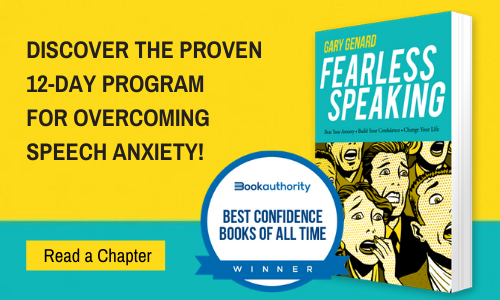
Did you know that confidence can be a strategy as well as a personality trait? Here's how to be more confident in job interviews and conversations.
Ready to boost your confidence level in two critically important areas of your professional life? This article completes the trilogy of "confidence and you." My first piece discussed 10 easy ways to make people have more confidence in you. And the second was on how to overcome your nerves and speak with confidence.
Today, we'll be looking at growing your self-esteem (and showing it) in interviews and conversations. The first is central to your obtaining the position that you desire; and the second is often instrumental in your doing well in that job and keeping it.
Becoming a more interesting and even memorable communicator is an achievable goal! Find out more in my free e-Book, "12 Easy Ways to Achieve Presence and Charisma."
Focus on Yourself, Not on the Interview
Few situations elicit more nerves and self-doubt than an important job interview. And that's no wonder, since a make-or-break employment interview—or a series of them with different executives at an organization—is an artificial situation. Despite your years of experience and examples of how you accept responsibility and change, everything is crystalized into an all-too-brief encounter, like the Big Bang in reverse.
In the job interview coaching we conduct at The Genard Method, we often find that the client is aiming for the wrong target. It's understandable, but still a mistake, to think that your task is to demonstrate what you know. The truth, however, is that a successful job interview isn't about what you know, or what you do in the situation to prove your worth. It's really all about who you are.
If you make it to a final one-on-one or appearance before a hiring committee, the organization already knows about your abilities and accomplishments. What the interviewer(s) are looking to get a sense of now, is what kind of person you are, how you think, whether you can adapt to change, and sometimes, how you would manage a problem where you can't know the answer. That's exactly the reason you may be handed a "from left field" question that doesn't appear to have anything to do with the job in question. They're looking for whether you'll be a good fit in the organization, not at the sum of your knowledge.
I usually make it a point, in fact, to include at least one such question when I coach and videotape candidates in simulated interviews. And almost always, we then spend most of our time together dissecting what the simulated interview shows in terms of maturity, ability to think on one's feet, the demonstration of a logical mind—and most important, skillfully using questions to come back to how you can use your past experience in service to this company. Those, then, are the areas you should be aiming toward in your prep. In other words: focusing on your ability to display who you are, not on interview questions that you can have no idea of ahead of time.
You'll also find some interesting get-ready-for-your-job-interview advice in Sue Shellenbarger's recent story in the Wall Street Journal, "Find Your Job-Interview Zen" (October 22, 2019, A12).

Focus on the Conversation, Not on Yourself
Conversations, on the other hand, both social and professional, are different. Here, the killer in the midst is often one's tendency to be self-regarding, rather than genuinely contributing to the discussion in progress.
One challenge here is that we all want to look good in the eyes of others. And so we can try too hard, and though we may not intend to, seem to be putting ourselves at the center of everything. Picture yourself at a party, where you hear an interesting remark or reference which draws you to the group of three or four people discussing that topic. That is the feeling that our participation in good conversations have: we are genuinely interested in what's being talked about and eager to contribute. It's no different, of course, in workplace conversations.
One of the most important concepts in all of public speaking is that the more we lose ourselves in service of those we're trying to reach, the more we succeed as effective communicators. It's one of my Six Rules of Effective Public Speaking. At those moments, we're fulfilling the whole task of speaking at any time: to give listeners something (usually information or our point of view) that we think will benefit them. To leave them, in other words, better off than they were before we shared our thoughts and feelings.
Confidence, like all aspects of speech communication really, isn't a product or even an attribute, but a process. We can approach it from the wrong angle by trying to create it out of thin air (think "power poses"). Or we can dive into the needs of those we're talking to, whether those people are hiring executives, friends and relatives, colleagues, or interested strangers. In other words, if we focus in the right direction depending upon the situation, we won't have to think of being confident at all.
You should follow me on Twitter here.
And take a look at my book Fearless Speaking, which was just named as one of The 100 Best Confidence Books of All Time!




